Wang Wang (旺旺), better known as ‘Want Want’ in English, has become all the rage in China in recent months. In its September issue, the Chinese magazine China Marketing (销售与市场) listed Want Want as the number one brand on its marketing noticeboard hot brand list, referring to it as “‘Lonely Warrior’ Want Want” (‘孤勇者’旺旺).
The Want Want Group (旺旺集团) is the most well-known rice cracker maker in China and one of the largest food and beverage makers in the region.
Want Want is a brand that many Chinese millennials grew up with. The Taiwanese company behind Want Want has a history that dates back to 1962. After becoming the dominant rice cracker maker in Taiwan with a market share as high as 95%, founder Tsai Eng-meng (蔡衍明) looked across the Strait and officially ventured into the mainland market in 1992.
Why is the Want Want brand still so popular in mainland China today? The brand’s success directly goes back to Tsai Eng-meng, who undeniably is a marketing genius with a peculiar style. The Want Want company icon, officially named Wang Zai (旺仔) in Chinese and ‘Hot Kid’ in English, was created in 1979 and depicts a kid with wide open arms and legs, rolling his eyes (fun fact: Hot Kid never looks straight at you).
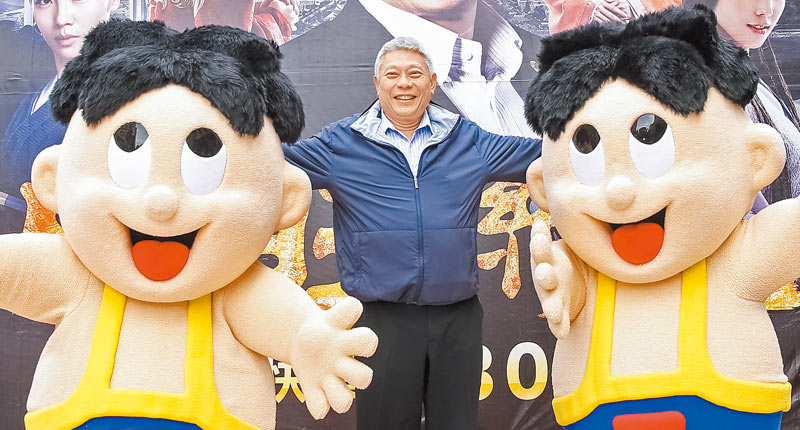
Want Want Group CEO Tsai with the Want Want icon ‘Hot Kid.’ Image via https://turnnewsapp.com/wd/74725.html.
With its catchy name and distinctive icon, Want Want soon became a household brand in China. Adding to the brand’s popularity are the many commercials throughout the years that show the brand’s style, standing out due to their simplicity and fun energy.
Some of these advertising campaigns have become part of the collective popular memory of Chinese millennials. On the Chinese video site Bilibili, old Want Want commercials bring up nostaligc feelings and still receive millions of views today (see this famous one, or see a collection of classic Want Want commercials on Bilibili here).
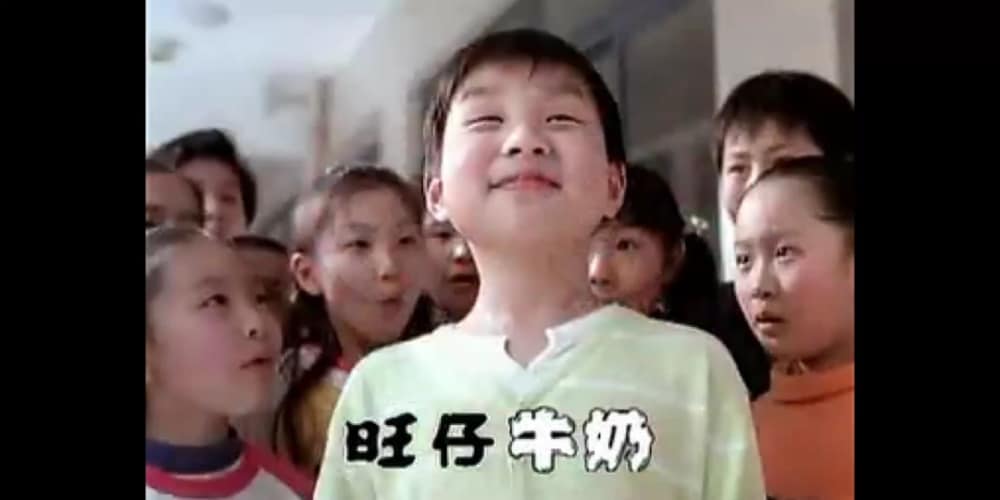
From one of Want Want’s iconic commercials.
Ingenious strategies brought great success to the company from the start and subsequently ushered in “the golden decade” for Want Want from 2004 to 2013, making Tsai the richest man in Taiwan for three consecutive years.
Apart from Want Want’s signature rice cracker products, products such as Hot Kid Milk (旺仔牛奶), Lonely God Potato Chips (浪味仙), and QQ Gummies (旺仔QQ糖) also became household names in the mainland.
However, facing more competition and failing to keep up with Chinese customers’ evolving consumption habits and preferences, Want Want was stuck in a bottleneck period and its sales slowed down after 2014. Its recent comeback and sudden social media success have everything to do with Nancy Pelosi’s controversial Taiwan visit in August of 2021.
A ‘GOOD’ TAIWANESE COMPANY
On July 28, Tsai Wang-Chia (蔡旺家), Tsai Eng-meng’s second son and Want Want’s Chief Operating Officer and executive director, posted three single words on his Weibo account (@Matt旺家): “YOU GO AWAY.”

The text was accompanied by a photo of an old witch, which just so happens to be the nickname Chinese netizens gave to Pelosi, and the timing of the post was right when reports about the U.S. House Speaker’s potential Taiwan visit were coming out. Want Want soon became a hot topic afterward.
People had already been paying more attention to Tsai Wang-chia’s Weibo account in light of the then-ongoing calls to boycott Taiwanese companies on Chinese social media following rumors regarding Pelosi’s controversial visit.
Someone claiming to be an employee at Want Want then posted on the popular Red (Xiaohongshu) app, defending Want Want for being a “good Taiwanese company,” asking people to “please don’t hurt us by mistake.” This triggered a public campaign of digging into Tsai’s previous posts, and netizens soon discovered that the Want Want executive director had published similar posts before.
In March of 2022, when a U.S. delegation visited Taiwan, Tsai bluntly posted: “The American pigs have arrived in Taiwan” (“美国猪到台湾了“).
Because of his consistent patriotic and pro-unification stance, coupled with a down-to-earth personality and plain-spoken style despite being an heir of a multibillion dollar family, Tsai Wang-chia soon won the hearts of millions of Chinese netizens.
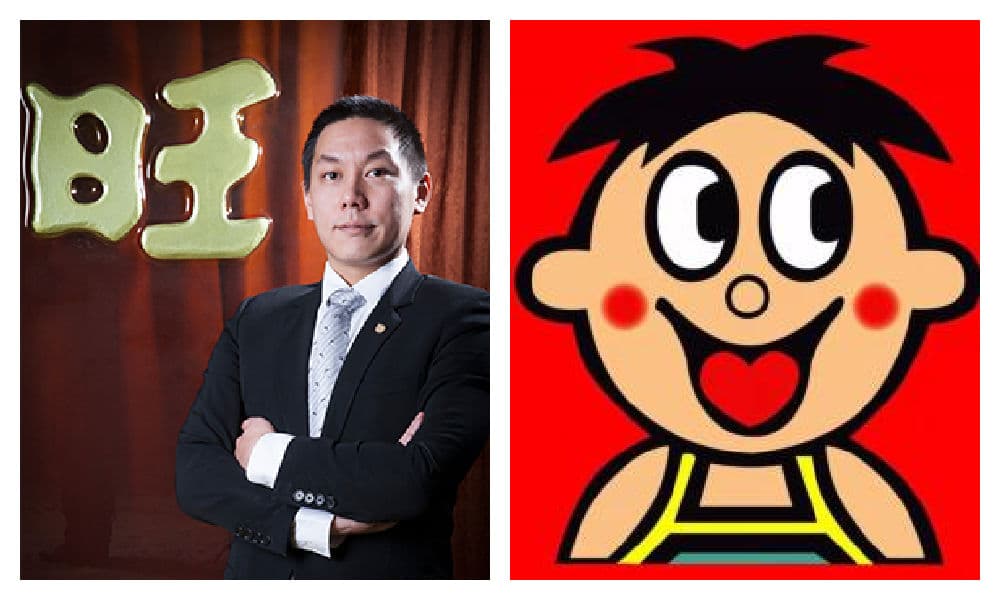
Tsai Wang-Chia (蔡旺家) and ‘Hot Kid’ (旺仔)
The hype got so so big that people started claiming that the figure of Want Want, the iconic Hot Kid, was actually based on Tsai Wang-chia as a child – despite the fact that ‘Hot Kid’ was created in 1979 while Tsai Wang-Chia was born in 1984.
PATRIOTIC ‘PRESIDENT WANT’
Tsai’s pro-unification sentiments seem to run in the family. Want Want founder Tsai Eng-meng, who is also commonly referred to as ‘President Want’ (旺董), has long been a unification supporter. This is also reflected in his business empire, which includes the Want Want China Times Group (旺旺中时媒体集团) that owns dominant pan-Blue (pro-China) media outlets in Taiwan.
Various videos, which soon widely circulated online, also showed ‘President Want’ expressing gratitude for the “great market of the mainland” (“因为有大陆这个伟大的市场,才造就了我旺旺的今天”) and proudly declaring that all Want Want employees are “impressive and dignified Chinese people” (堂堂正正的中国人).
To the delight of many Chinese netizens, more events and incidents showing Want Want’s patriotic stance were brought to light one after another.
The company filed for IPO on the HK Stock Exchange in 2008 with the name “Want Want China Holdings Limited” (中国旺旺控股有限公司); its Want Want Hospital in Hunan (湖南旺旺医院) was among the first private institutions to send a medical aid team to Wuhan during the initial COVID outbreak in the city; in 2019, when a Taiwanese celebrity mockingly said on a local program that “mainlanders cannot afford to eat pickles”, its newspaper Want Daily (旺报) published a conspicuous headline on its August 18 frontpage saying “MAINLANDERS CAN AFFORD TO EAT PICKLES!” (“大陆人吃得起榨菜!”), noting on the side: “Taiwanese are Chinese. We are from the same country and therefore should support each other.” (“台湾人就是中国人. 我们都是同一国的,所以当然要相挺.”)
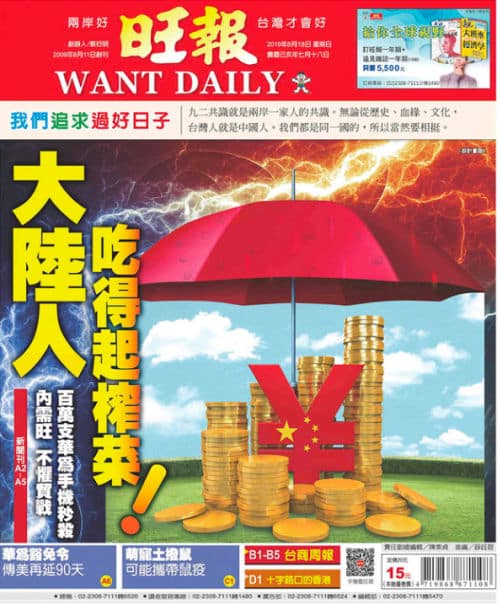
In early August of this year, Want Want soared to the top of Weibo’s trending list, and netizens swarmed its live stream channel on Taobao, vowing to “consume wildly” (“野性消费”) and “empty their stock” (“清空库存”) in support of the brand.
According to the Time Weekly (时代周报), a government-owned newspaper from Guangzhou, the number of viewers on the channel that day reached almost 100,000 – up to ten times more than what the channel usually received in viewers, – and sales of its online shop spiked as many new customers came in after following the trending hashtag.
THE OTHER SIDE OF THE COIN
In contrast to Want Want’s fervent popularity in mainland China, the brand has become more controversial on the other side of the Taiwan Strait, especially in light of its ownership of multiple leading media outlets, with many expressing worries that its dominant position might impact press freedom.
In June of 2019, a predominantly young mass rallied against so-called “red media” (Taiwanese media in favor of Beijing), with Want Want-owned newspapers (China Times 中国时报 and Want Daily 旺报) and TV channels (China Television 中国电视公司 and CTiTV 中天电视台) being among the main targets.
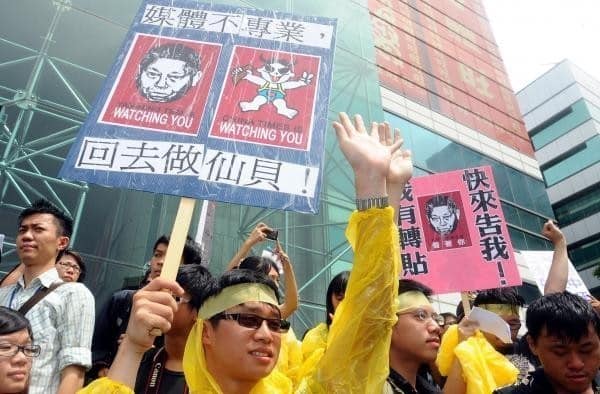
Protesting against Want Want and other ‘pro-China’ companies in Taiwan, image via https://news.ltn.com.tw/news/life/breakingnews/2859708
The following month, the Financial Times published an article, quoting anonymous journalists working for these outlets, saying that their editorial managers took direct instructions from Beijing’s Taiwan Affairs Office, a claim that the Want Want China Times Group later responded to as “malicious slander.”
In late 2020, the Tsai Ing-wen administration stripped CTiTV of its broadcast license upon renewal out of concerns about editorial interference by President Want Tsai Eng-meng. Such a ruling was a first since the founding of Taiwan’s National Communications Commission in 2006, a government body that regulates the industry, and evoked opposition from the ‘Blue Camp’ and controversy among the public.
SUCCESSFUL ON ALL FRONTS
Despite receiving criticism in Taiwan, Want Want has continued its success in mainland China. This year, Want Want is celebrating the company’s 60th anniversary, as well as the 30th year anniversary of the opening of its first factory in mainland China.
China Marketing wrote about Want Want’s 2022 success that “consistency is key” in marketing. Not only did the brand stick with its original logo and traditional products such as rice crackers and its dairy drink, it has also focused on nostalgic or playful ad campaigns throughout the years (think of its successful slogan “You Want, I Want, Everyone Wants” “你旺、我旺、大家旺.”)
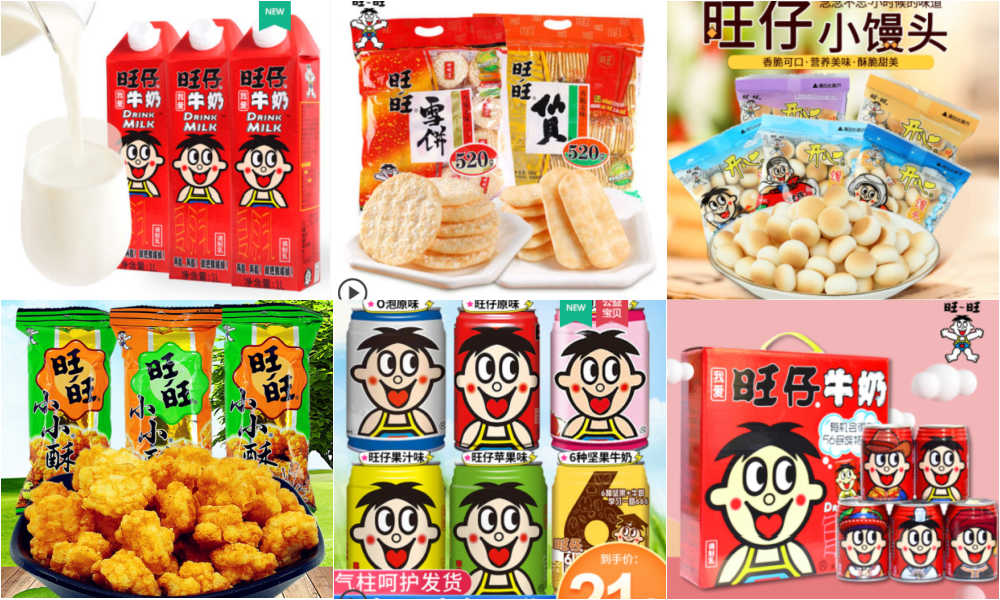
Want Want products for sale on Taobao.
At the same time, the company is not afraid to launch new products and stay active in the world of Chinese social media and e-commerce.
But what has really become an essential point in its regained success this year is the brand’s consistency in delivering a patriotic message through multiple channels that resonated with Chinese consumers at a time of deteriorating US-China relations and more focus on cross-strait relations.
Erke, the Chinese sportswear brand by Hongxing Erke Group (鸿星尔克), was also brought back into the limelight in 2021 after they donated 50 million yuan ($7.7 million) to the Henan flood efforts. When people found out that the relatively low-profile brand donated such a high amount of money to help the people in Henan despite its own losses, its online sales went through the roof – everyone wanted to support this generous ‘patriotic brand.’
While nationalistic consumer sentiments matter, being a ‘patriotic brand’ alone is not enough; it eventually is the combination of being consistent and authentic, delivering popular products, and having a strong marketing campaign. When it comes to the mainland market, Want Want tackled all fronts this year.
In October of 2022, Want Want celebrated China’s National Day by using drones to project netizens’ hopes and wishes for the future all over the Great Wall, including a projection of a giant Want Want drink (#旺旺把爱国刻进了DNA#).
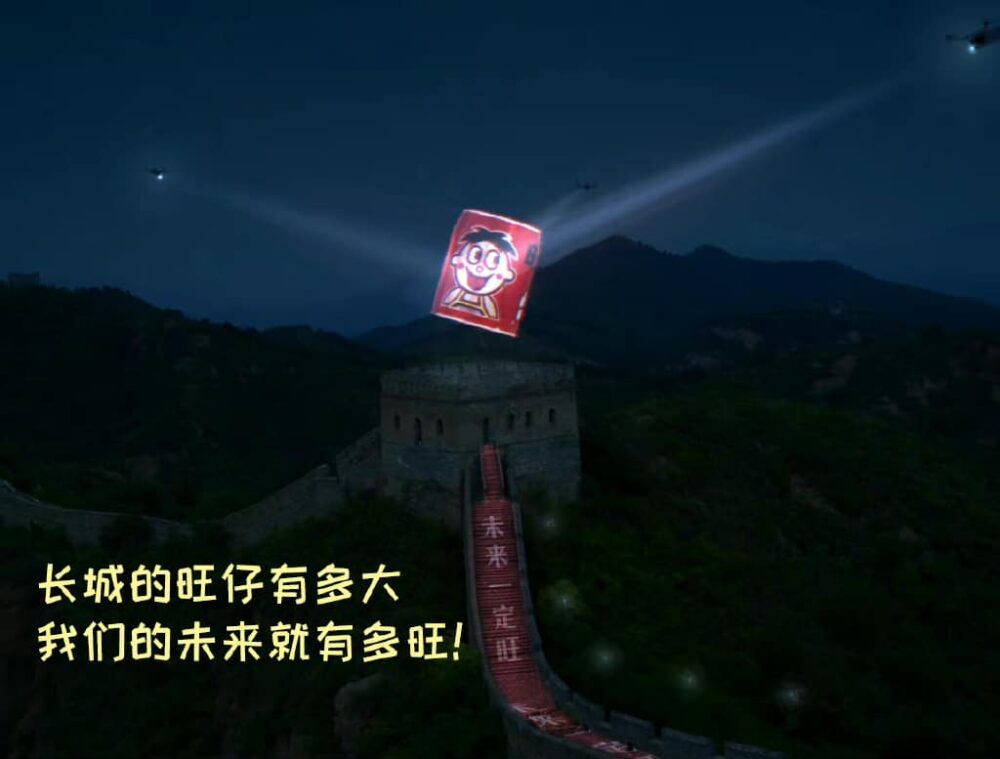
For now, Want Want has practically made ‘loving China’ a part of its brand. Mixing rice crackers with some nationalism is turning out to be a recipe for success – at least in the mainland.
By Tucker Jiang, with contributions by Manya Koetse
Get the story behind the hashtag. Subscribe to What’s on Weibo here to receive our weekly newsletter and get access to our latest articles:
Spotted a mistake or want to add something? Please let us know in comments below or email us. First-time commenters, please be patient – we will have to manually approve your comment before it appears.
©2022 Whatsonweibo. All rights reserved. Do not reproduce our content without permission – you can contact us at info@whatsonweibo.com.
The post Why Is Want Want So Popular in China? The Remarkable Revival of an Iconic Brand appeared first on What's on Weibo.